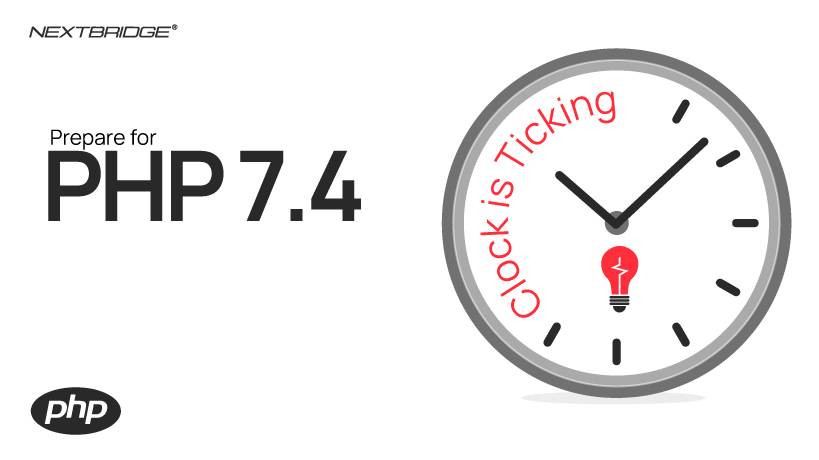 Back to all articles
Back to all articles
Blogs
The Clock is Ticking: Prepare for PHP 7.4 EOL


The tech sector, including tools, frameworks & languages, is rapidly growing day by day. Consequently, the same is true in the app development industry, where staying current with new releases and versions is crucial to guaranteeing functionality and security.
PHP 7.4, which was released on 28 November 2019, is popular among developers for a range of improvements. In this blog, we will explore PHP 7.4's impending End-of-Life (EOL) and updating to PHP 8.0, 8.1 & 8.2, emphasizing the significant changes and PHP 7.4 release dates.
Comprehending PHP Versions
PHP has a long history, with each version adding enhancements, bug fixes, and new features. It's important to remember, though, that PHP versions have a limited lifespan. As a result, older versions eventually reach their EOL, at which point they stop receiving security patches, updates, and official support.
PHP 7.4
Since its initial release on November 28, 2019, PHP 7.4 has become very popular due to its numerous language modifications and performance improvements. But good things come to an end, and on November 28, 2022, it will reach its end of life.
This is the date by which the PHP development team will no longer be able to provide active support, bug fixes, and security upgrades for this version of PHP. Maintaining PHP 7.4 EOL could put your apps at risk for security flaws and compatibility issues.
Major Changes in PHP 8:
To upgrade to PHP 8.0 without any problems, it is important to understand these major changes. Shifting from PHP 7.4 to PHP 8 might take a bit of effort, but it makes your app safer and faster and introduces new features.
Here are some important changes in PHP 8.0.
| Feature | Descriptions |
| JIT (Just-In-Time) compile | Making your code faster and more efficient. |
| Union Types | Allow multiple data types in the function. |
| Named arguments | Make code clearer and reduce errors |
| Constructor property promotion | Cuts boilerplate code by auto-creating class properties |
Key features & Improvements in PHP 8.1
PHP 8.1 was released in December 2021, and it added a lot of features:
- Enums:
They create a set of named constants that make code easier and readable.
- Read-only properties:
Keeping your data safe so properties can be set only and cannot be changed later.
- Fibers:
Without slowing down your program, they allow code to do many tasks at the same time.
- Intersection Types:
Variations can be created for more than one type at the same time, and your code will be safer.
- First-class callable syntax
Functions can be used more flexibly in your code.
PHP 8.2 New Features & Improvements
PHP 8.2 was released on December 22 and introduced several useful updates.
- Readonly classes:
Keeping your data safe after creation, the entire data cannot be changed.
- DNF Types:
By using logical operators, this feature allows for more complex types of constraints, and this provides greater flexibility
- Standalone Type:
Null, false, and true are used directly as types and enhance clarity in type declarations.
- Hide sensitive data:
By automatically redacting parameters, this feature helps to protect sensitive information.
- New Random functions:
The fastest and easiest ways to generate random numbers.
Upgrade PHP 7.4 to 8.0:
Follow an upgrade plan while switching from PHP 7.4 to PHP 8.0.
| Steps | Descriptions |
| Review Codebase | Reviewed and checked your code to verify that it works on PHP 8. |
| Refresh your libraries. | Updated frameworks & extensions |
| Testing Performance | Test before going live and solve all errors & bugs. |
| Staged Deployment | Updating Modules and Components |
| Expert Help | We get advice from a PHP expert |
Benefits and drawbacks of upgrading PHP 7.4 to PHP 8.0
Almost 77% of developers chose PHP because of its reliability and simplicity. Every version is updated, and they add new features, making the version better. We discussed how to handle 7.4 EOL and what makes PHP better in newer versions. Now we will explain its benefits & drawbacks.
Benefits of upgrading to PHP 8.0:
- Faster Performance:
The app runs faster than ever in PHP 8, and its JIT compiler makes code better, resulting in its overall speed improvements
- Adding New Features:
PHP 8 is adding new features like the null-safe operator, union types, attributes, named arguments, etc., and more, granted to developers to write code cleanly and expressively.
- Stronger Type Checking
Developers can enable stricter-type rules in PHP 8. This makes it reduces errors in code and makes the code reliable.
- Improves Error Handling:
PHP 8 introduced the throwable interface; this may improve the handling of different types of errors.
Drawbacks of upgrading to PHP 8.0:
- Working with old code:
From PHP 7.4, PHP 8 removes some outdated features, and if your code is still using them, it will need extra effort to upgrade the code.
- Issues with Libraries and Extensions:
Some extensions and libraries (or frameworks) may not work as intended when upgrading to PHP 8. Make sure you pre-check all third-party dependencies your application depends on and ensure the biggest part of them are compatible with PHP 8.0 before doing an upgrade.
- Learning a new feature:
Developers may need time to learn and adjust to the new features and advancements in PHP 8. This adjustment period may temporarily hinder development as they become familiar with the updated syntax, features, and best practices introduced with PHP 8.
- More Testing Required:
Before moving to the new version, you should test your app to ensure that it runs smoothly and remains stable and that it take too much time to consume.
- Restricted Assistance for Earlier PHP Versions
It should be necessary to switch to PHP 8 because older PHP versions have issues in their EOL and secret issues & bugs. By adapting the PHP 8, we are assured of security and maintenance
If your applications depend on a 3rd party or other factors, then they will be contradictory with PHP 8.
Final Thoughts
As PHP 7.4 is coming to an end, developers and companies must start using PHP 8.0, 8.1 & 8.2 because by using these versions, you can get new features and improvements, so upgrade to PHP 8 right away to give your PHP projects a brighter future.
Don't hire us right away
talk to our experts first,
Share your challenges, & then decide if we're the right fit for you! Talk to Us
Partnerships & Recognition
Commitment to excellence






